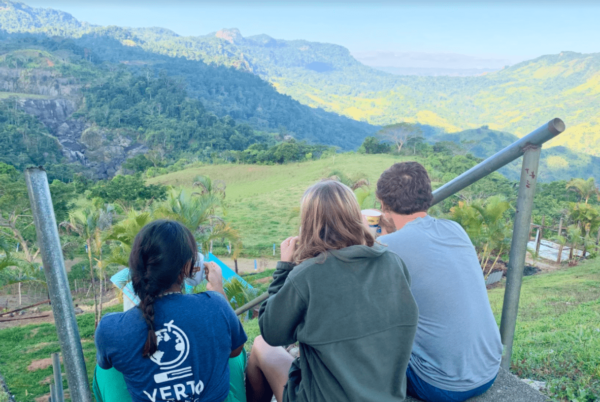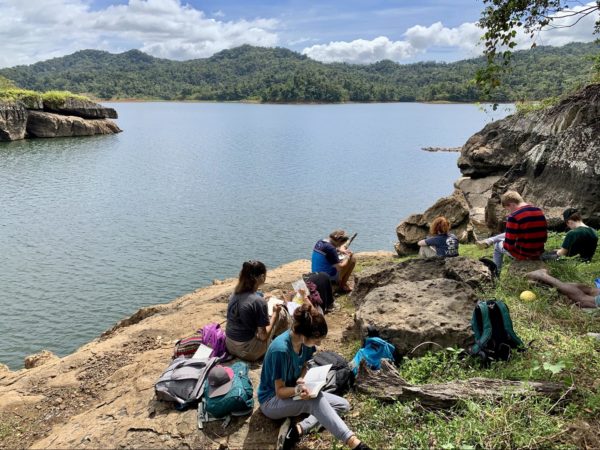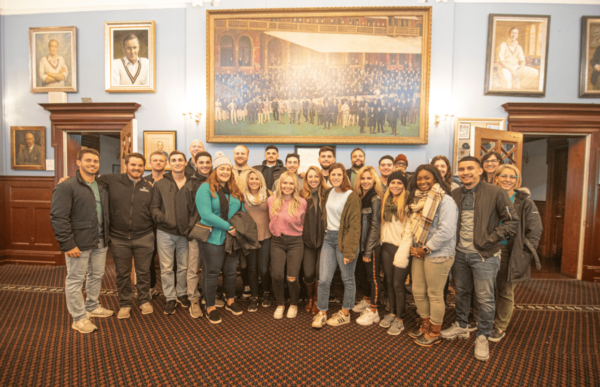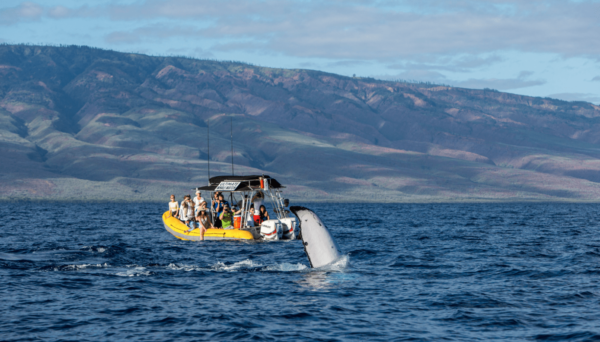
Verto students go out of their comfort zones to discover themselves and the world around them, giving them valuable life experience. Here, students in Fiji take a coffee break between classes.
If you’ve read our Verto and Employability article, you already know that as a Verto alum, you’ve graduated with some seriously sought-after skills. Even better, we know you’ve walked away with tons of amazing ideas about how to change the world.
So how can you take all that momentum and channel it into securing an epic job that allows you to make an impact and pursue your dreams?
We have some great ideas to get you started!
Here’s how you can use your Verto experience to stand out…
On Your Resume
Location, Location, Location.
Rather than adding your Verto semester under your “Education” heading, consider adding your volunteer or impactful classroom experiences under headings like “Volunteer Experience, “Leadership Experience” or “Interests and Skills.” This can be especially useful for Freshman who might not have much work or volunteer experience to fill up a resume. If you want to share specifically about academics, you can always add relevant coursework or research projects under the “Education” heading.

Verto coursework goes beyond the classroom – like these student completing their journals riverside in New Zealand – generating experiences worthy of listing in a variety of places on your resume.
It’s not one-size-fits-all.
A common misconception is that applicants can use one resume for any job. Potential employers will notice if your resume includes experiences that aren’t relevant to the job and this might make it seem like you’re not taking the application seriously. It’s important to highlight experiences in the same or a similar field and/or experiences that demonstrate the skills the employer is seeking. Aim for quality over quantity.
That being said, there’s no need to start from scratch for each job! Build a template that you can quickly update and keep a running log document of anything you might want to include on a resume. (The log could include any work, leadership or volunteer experiences, as well as awards, skills and interests). Have the bullet points and dates for each experience written out and ready to go so that you can easily pick and choose the most appropriate examples as new job opportunities come up.

Language learning, like these students on the Spain semester in Spanish class, is an example of a transferrable skill.
Show Off Your Skills.
Don’t forget that you can also name any specific skills you gained under the “Skills” section. Did you learn how to use a new software? Do quantitative data analysis? Write an ethnography? Be sure to include any language competencies you developed on your semester as well!
It’s best to use the “Skills” section for hard skills rather than soft skills, since it is much stronger to demonstrate soft skills through example. For example, if you want to convey your skills of cross-cultural communication and teamwork, you can say something like, “Collaborated with students from 3 different countries to complete a research project on Regional Music.”
Make it Pop.
No matter what awesome experiences you include on your resume, your points won’t have a strong impact unless they’re worded advantageously. Some tips for leaving a lasting impression include:
– using strong action verbs to describe your experiences; powerful word choice can help underscore your initiative, leadership, and hard work. This link is a great resource for finding stronger language.
– framing your bullet points by putting the results first; this helps you show, rather than tell, about your skills through concrete achievements. If you want to add details about how something was achieved, you can follow a general format of “Achieved X by doing Y.” This could look like: “Spread resources on sustainability to 2 non-profits, by leading research project on calculating carbon footprints” or “Campaigned for Wildlife Reserve by creating 3 promotional posters.”
– quantifying when appropriate; great employers are data-driven and love to see impact measured by numbers. For example, instead of saying “Visited various NGOs” you’d want to be specific by describing, “Visited 4 NGOs across 3 cities” or instead of writing “Learned about corporate culture” you could share, “Observed 3 different corporate cultures through shadowing experiences in London.”
In Interviews
Get Specific.
If you feel your Verto Education experience was “life-changing” it’s important that you can articulate exactly how and why. Now is an amazing time to relive your adventures by reflecting on the impact of your semester:
– What did you learn about yourself? About your desires, strengths and weaknesses?
– In what ways have you become a better citizen, team player, or student?
– What new skills did you develop?
– What exposure (to organizations, issues, or different ways of life) did you gain and how has that changed your perspective?
These questions are not only important to reflect on for your personal growth, but will also help guide you towards sharing about your experience most clearly.
Rather than using big statements, be as specific as possible with your examples. A great practice is to look up some typical interview questions and think about which stories might help you address certain questions or themes. Match each story with a critical point you want to portray about a skill you gained, developed or exercised.

When it comes to interviews, focus not just on the museums you visited and excursions you remember (like these students on the London semester), but also on the impact of those experiences.
Talk about Impact.
Given all the adventures you’ve had, it’s super easy to get excited talking about where you went, what you saw, and who you met. Keep in mind though, that employers are much more interested in learning about what you have achieved and what you can achieve. When talking about your Verto experience, be sure to keep the focus on how you were able to make an impact or how the experience impacted you. The STAR method (“Situation, Task, Action, and Result”) can be a really helpful format for sharing stories effectively. Read more about how to use the STAR method here.
Connect the Dots.
Help the employer connect the dots of why they should care by articulating how your experiences relate to and benefit them.
Before going in for an interview, carefully read the job description to see the types of experiences, traits, and skills the employer is seeking. Choose relevant stories, center your answers around those skills, and take it one step further by connecting to how that skill would make you an asset for the company. You can connect what you’ve already learned or achieved to specific projects you’re excited to work on (and why your skill set would allow you to thrive in them), subjects you’ll be able to learn more about or an initiative you want to start.

What’s your “bigger picture?” Perhaps your Verto semester reflects your interest in sustainability or conservation of wildlife, like these students on an expedition in Hawaii.
Spell out the bigger picture.
Employers are excited by candidates who demonstrate passion, vision and drive. If you’re feeling stuck about how to portray the meaningfulness of your Verto semester, you can always connect your experiences to your goals and the bigger picture. You could talk about how your visit to a certain organization inspired you to work on a new project, how you were exposed to an issue you didn’t know much about before, or how you gained a more global understanding of a topic. These insights can help employers know more about your “why” and what motivates you to do this type of work.
Language Matters.
When sharing about your experiences, use high impact language. Utilizing certain phrases and buzzwords can help you turn your stories into a testament to your employability. For some great suggestions about how to frame stories to your advantage, check out this article and this one as well.
Follow these tips and you are sure to dazzle any potential employer with all of the wisdom, experiences and skills you gained on your Verto semester!
At Verto, we want to help students put their best foot forward when it comes to success in college and beyond. We’d love to chat if you want to learn more about how we can make a semester abroad possible for you.

